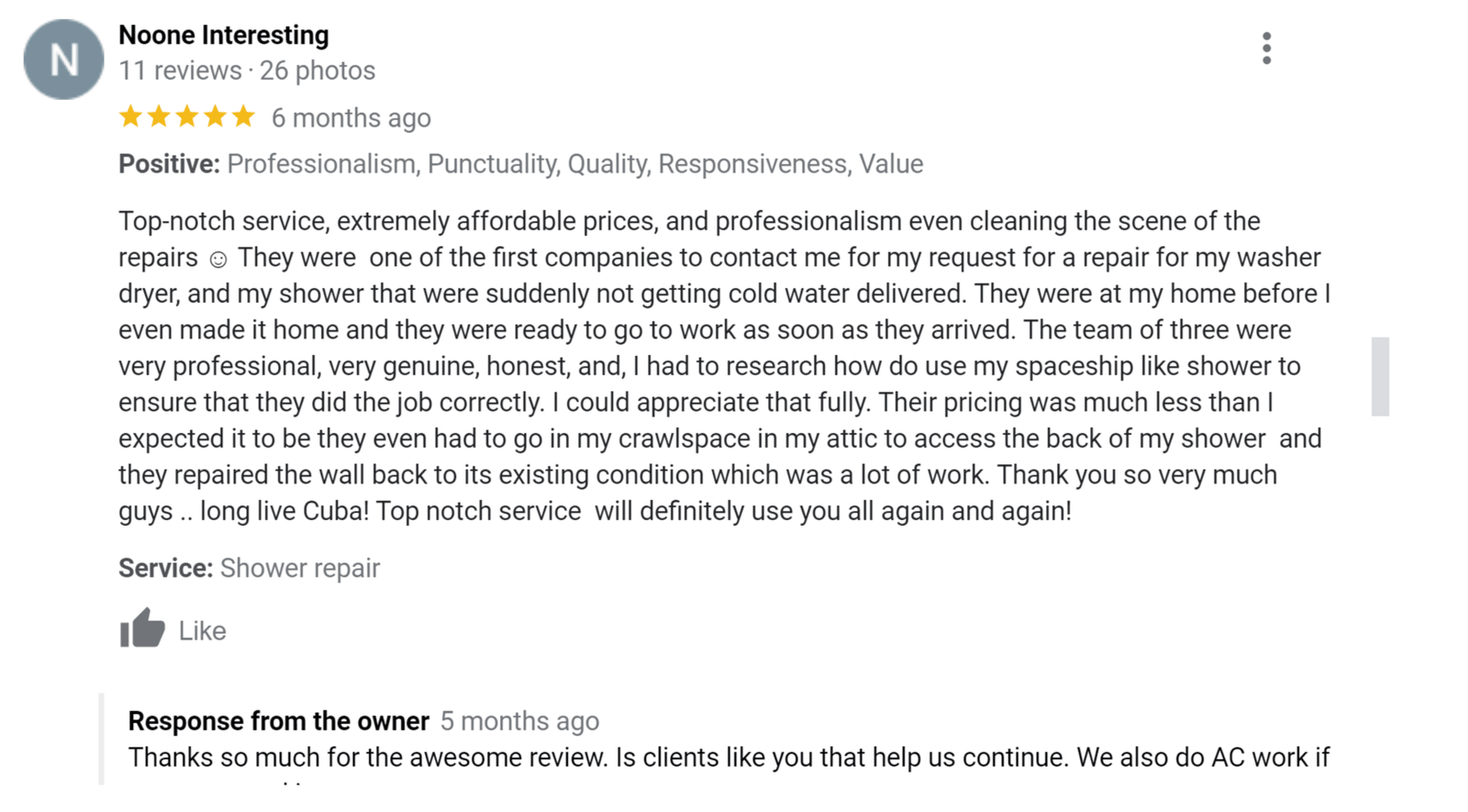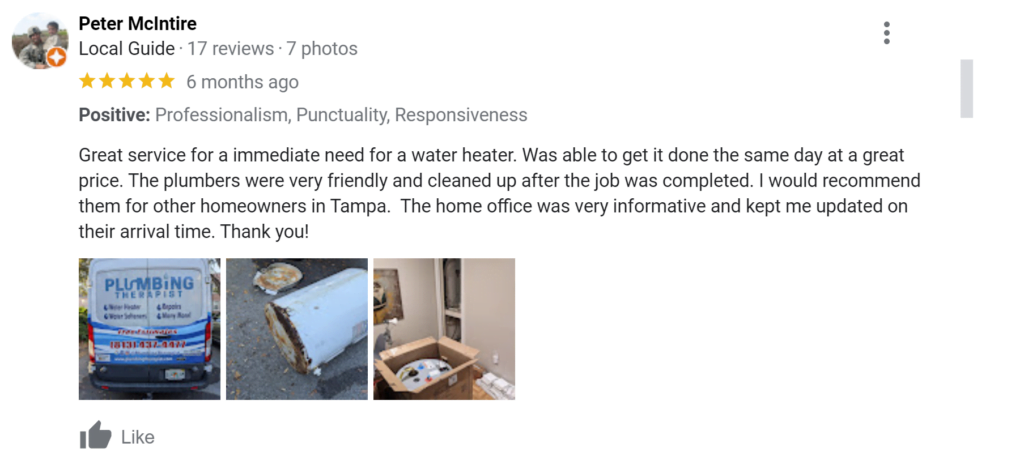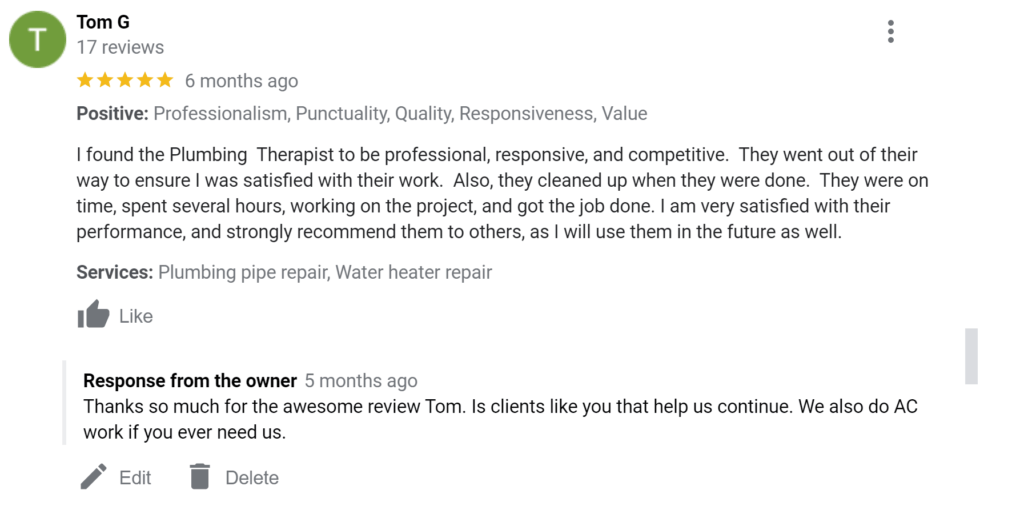Water Leak Detection
Discover reliable Water Leak Detection services from Plumbing Therapist, your trusted experts in plumbing solutions. We quickly identify and repair leaks to save you time and money, ensuring the safety and longevity of your plumbing system. Call us today!
Do You Need Our Help ?
Feel free to contact us now
$99 Water Heater Flush + Free Plumbing System Inspection
Water Leak Detection in Tampa Bay
Reliable Water Leak Detection Services by Plumbing Therapist in Hillsborough County, Pinellas County, and Pasco County
Are you concerned about a potential water leak in your home or business? Look no further than Plumbing Therapist for fast, dependable Water Leak Detection services. Our certified plumbers are experts at locating and fixing leaks, saving you from costly damage down the line.
Why Choose Plumbing Therapist for Water Leak Detection?
Experienced Professionals
Our team of certified plumbers has years of experience in detecting and fixing water leaks. We use advanced techniques and state-of-the-art equipment to find the source of the leak quickly and accurately.
Fast Response Time
We understand the urgency of a water leak. That’s why we are committed to providing prompt services, aiming to resolve the issue as quickly as possible to minimize damage.
Cost-Effective Solutions
We offer transparent pricing with no hidden costs. Our affordable water leak detection services are designed to save you money in the long run by preventing more severe water damage.
Don’t let a small leak turn into a big problem. Contact Plumbing Therapist today for dependable, affordable water leak detection services.

Why partner with Plumbing Therapist?
Quality, Affordability, and Expertise.

No Hidden or Unexpected Charges

Free Estimates & Online Booking Available

Professionally Trained Technicians

Honesty is Guaranteed

Quick Communication & Service Within 24 Hours

400+ 5 Star Reviews

Why do I need to fix a water leak immediately?
At Plumbing Therapist, we understand the urgency of fixing water leaks immediately. Here’s why prompt action is essential:
1. Preventing Water Damage: Small leaks can escalate quickly, causing extensive damage to your home’s structure – including walls, floors, and ceilings. Early repair can save you from these costly repairs.
2. Mold and Mildew Prevention: Moist environments caused by leaks are perfect for mold and mildew growth. These not only pose health risks but can also damage your home and lead to musty odors.
3. Conserving Water: A persistent drip is not just an annoyance; it’s wasteful and environmentally unfriendly. Over time, this can lead to increased utility bills and needless water waste.
4. Electrical Safety: Water near electrical systems is a serious risk. It can cause short circuits, posing fire hazards or the risk of electrocution. We prioritize your safety by addressing leaks swiftly.
5. Health Considerations: Dampness can adversely affect your health, particularly for those with respiratory conditions. By fixing leaks quickly, we help maintain a healthier living environment.
6. Avoiding Pest Infestations: Leaks create damp areas that attract pests like termites and rodents, which are not only a nuisance but can also cause further damage to your property.
7. Maintaining Property Value: Ongoing leaks and the resultant damage can decrease the value of your property. By addressing leaks promptly, we help in maintaining and potentially increasing your property’s value.
At Plumbing Therapist, we’re dedicated to quickly and efficiently resolving your water leak issues to protect your home, health, and wallet. Don’t let a small leak turn into a big problem – contact us immediately for expert assistance!
If you would like more information, feel free to give them a call at (813)-437-4477 or you can book online and get their latest discount!
Customer Testimonials: Real Experiences with Plumbing Therapist
We proudly share the experiences and stories of our valued clients. Their feedback provides a glimpse into the quality of service and commitment to excellence we uphold at Plumbing Therapist. You'll read firsthand how our plumbing solutions have improved comfort and efficiency in homes across Tampa Bay. These testimonials illustrate our dedication to customer satisfaction and the difference our expert services can make.




Your questions answered
Common Water Leak Detection Questions:
How can I tell if I have a water leak?
Detecting a water leak in your home involves being vigilant for several signs. Here’s how you can tell if you might have a water leak:
Unexpected Increase in Water Bills: If your water usage habits haven’t changed but your bill has spiked, it could indicate a leak.
Sound of Running Water: Listen for the sound of running or dripping water when all faucets, toilets, and appliances are turned off.
Mysterious Wet Spots: Unexplained wet spots on floors, walls, or ceilings can be a telltale sign of a leak.
Mold and Mildew: Unusual mold or mildew growth, especially in places that are usually dry, can indicate hidden moisture from a leak.
Water Meter Changes: Check your water meter before and after a two-hour period when no water is being used. If the meter changes, there’s likely a leak.
Foul Odors: Persistent musty or earthy smells can be a sign of water stagnating somewhere it shouldn’t be, often due to a leak.
Cracks in Foundation: Leaks can cause your house’s foundation to crack as water erodes the ground.
Deteriorating Wallpaper or Paint: Wallpaper or paint that is peeling, cracking, or blistering might be a sign that there’s moisture in the walls.
Lush Patches in Grass: If parts of your lawn are particularly lush or green compared to the rest, or you see wet spots in your yard when it hasn’t rained, it could be due to an underground leak.
Water Pressure Changes: A noticeable drop in water pressure when using faucets or showers could indicate a leak in your system.
If you notice any of these signs, it’s wise to investigate further or call a professional plumber like Plumbing Therapist for a thorough inspection and repair. Early detection can save you from more extensive and costly repairs later on.
What are the common causes of water leaks in a home?
Water leaks in homes can be caused by a variety of issues, ranging from simple wear and tear to more complex systemic problems. Here are some of the common causes:
Aging Pipes: Over time, pipes can corrode, rust, or deteriorate, especially in older homes, leading to leaks.
High Water Pressure: Excessive water pressure can strain pipes, causing them to crack or burst.
Temperature Changes: Pipes can expand and contract with temperature fluctuations, leading to cracks or leaks. This is particularly common in areas with freezing temperatures.
Clogged Lines: Blockages, especially in sewer lines or drains, can lead to overflowing and leaks.
Faulty Pipe Joints: The weakest point in a plumbing system is often where the pipes connect. Over time, these joints can degrade or loosen, causing leaks.
Damaged Seals: Appliances like dishwashers and washing machines have seals to keep water in. As these appliances age, the seals can break down and leak.
Loose Water Connectors: Hoses and pipes that supply water to appliances can become loose over time, leading to leaks.
Cracked or Broken Pipes: Various factors, including shifting soil, tree root intrusion, or physical impacts, can cause pipes to break.
Poor Pipe Installation: Inadequate installation can lead to leaks. This is often seen in DIY plumbing or older homes where plumbing standards were different.
Corrosion: The chemical composition of water can cause certain types of piping materials to corrode over time, leading to leaks.
Intrusive Tree Roots: Tree roots can grow into and around piping, especially sewer lines, leading to cracks and leaks.
Worn Toilet Flappers: Over time, the flapper in the toilet tank can degrade, causing slow leaks into the bowl.
Understanding the causes of water leaks is crucial for both prevention and effective repair. Regular maintenance and inspections, especially in older homes or in areas with extreme weather conditions, can help identify potential problems early. If you suspect any of these issues, contacting a professional plumber, such as Plumbing Therapist, is a wise step to ensure proper diagnosis and repair.
Can a small leak cause significant damage?
Yes, a small leak can indeed cause significant damage over time. It’s a common misconception that only large, dramatic leaks are harmful. In reality, even a minor, seemingly insignificant leak can lead to a range of serious problems if left unaddressed:
Structural Damage: Continuous water exposure can weaken structural elements of a building, including beams and foundations. Wood that stays wet can rot, compromising the integrity of the structure.
Mold and Mildew Growth: Small leaks create damp environments, ideal for mold and mildew to flourish. This not only damages your property (like walls, flooring, and ceilings) but also poses health risks, particularly for individuals with allergies or respiratory issues.
Electrical Damage: Water from leaks can reach electrical wiring and outlets, posing a risk of short circuits and potential fire hazards.
Increased Utility Bills: Even a slow drip can add up to a significant amount of wasted water, leading to unnecessarily high water bills.
Pest Infestations: Damp conditions can attract pests like termites, ants, and rodents. These pests are not only a nuisance but can also cause additional damage to your property.
Damage to Personal Property: A leak can damage personal items like furniture, electronics, clothing, and important documents.
Aesthetic Damage: Water stains, peeling paint or wallpaper, and warped flooring can be the result of ongoing leaks, impacting the appearance and comfort of your home.
Decreased Home Value: Signs of water damage can reduce the value of your property and deter potential buyers.
It’s important to address any leaks, no matter how small, as soon as they are detected to avoid these costly and hazardous outcomes. Regular maintenance and early intervention, like the services offered by Plumbing Therapist, are key to preventing small leaks from becoming big problems.
How do plumbers detect hidden water leaks?
Plumbers use a variety of specialized tools and techniques to detect hidden water leaks, especially when the leak is not immediately visible or accessible. These methods allow for accurate detection without causing unnecessary damage to walls, floors, or other parts of the property. Some common techniques include:
Acoustic Leak Detection: This method uses sensitive listening devices to detect the sound of water escaping from pipes. Plumbers use ground microphones and listening discs to amplify the noise of the leak, even through concrete or soil.
Infrared Thermography: Infrared cameras can detect variations in temperature caused by wet spots and leaks. These thermal imaging devices can visualize the cooler temperatures of escaping water, identifying the exact location of the leak.
Video Pipe Inspection: For hard-to-reach places, plumbers might use a small camera attached to a flexible rod that can be inserted into pipes. The camera transmits video feed, helping to visually identify leaks and other issues inside the pipes.
Pressure Testing: This involves isolating different sections of plumbing and checking them for pressure loss. A significant drop in pressure can indicate a leak in that section.
Moisture Sensors and Meters: These tools can detect high levels of moisture in walls, floors, and ceilings, which often indicate the presence of a leak.
Dye Testing: In some cases, non-toxic dye can be introduced into the water system. The appearance of the dye in certain areas can help pinpoint the location of the leak.
Gas Tracer Systems: Safe, non-toxic gases like hydrogen or helium can be introduced into the pipe. Since these gases are lighter than air and will rise to the surface, a gas detector can be used to locate the leak.
Electronic Leak Detection: This method is often used for underfloor heating systems or large building complexes. It involves using specialized electronic equipment to detect the electrical impulses generated by the leaking water.
Each method has its advantages and is chosen based on the specific situation, the type of building, and the suspected location of the leak. Professional plumbers like Plumbing Therapist have the expertise and equipment to select and use the most appropriate technique for accurately detecting hidden leaks, ensuring minimal disruption to your property.
Is it possible to prevent a water leak?
While it’s not possible to prevent all water leaks due to various uncontrollable factors, many leaks can be avoided with proper maintenance and proactive measures. Here are some steps you can take to reduce the likelihood of leaks in your home:
Regular Inspections: Regularly inspecting pipes, appliances, and plumbing fixtures for signs of wear and tear can help catch issues before they turn into leaks.
Maintain Water Pressure: Ensure your water pressure is within a safe range. High water pressure can stress your plumbing system and increase the risk of leaks.
Install Leak Detection Systems: Modern leak detection systems can alert you to the presence of moisture or leaks, allowing for early intervention.
Replace Aging Pipes: If your home has old or corroding pipes, consider having them replaced before they fail.
Winterize Pipes: In cold climates, insulate pipes to prevent them from freezing and bursting.
Monitor Appliance Hoses and Connections: Regularly check hoses on appliances like washing machines and dishwashers for cracks or leaks.
Use Water Softeners if Necessary: If you have hard water, it can speed up corrosion in pipes. Using a water softener can help.
Avoid Chemical Drain Cleaners: These can corrode pipes over time. Use enzyme-based cleaners or mechanically clear clogs.
Fix Small Problems Promptly: Addressing small issues like dripping faucets or running toilets can prevent larger problems later.
Educate Your Household: Make sure everyone in your home knows how to turn off the water in case of a leak and is aware of what not to flush or pour down drains.
By following these steps, you can significantly reduce the risk of leaks in your home. Remember, regular maintenance and early detection are key, and for any major concerns or installations, it’s wise to consult with professional plumbers like Plumbing Therapist.
How long does it take to fix a water leak?
The time it takes to fix a water leak can vary significantly depending on several factors. These include the location of the leak, its severity, the type of repair needed, and the accessibility of the plumbing. Here are some general guidelines:
Minor Leaks: Simple leaks, such as those in easily accessible pipes, faucets, or showerheads, can often be repaired within a few hours.
Moderate Leaks: Leaks that require more extensive work, like replacing sections of pipe or fixing leaks in walls or under floors, might take a full day or a bit longer.
Major Leaks: Significant leaks, such as those requiring major pipe replacement, re-plumbing sections of the home, or dealing with water damage, can take several days to a week or more, particularly if they involve extensive restoration work.
Emergency Situations: In cases of severe leaks or burst pipes where water is causing immediate damage, plumbers typically act quickly to control the situation. Initial emergency repairs to stop the water flow might be done quickly, but follow-up repairs for damage and comprehensive solutions can extend the repair time.
Accessibility and Complexity: The time required can also increase if the leak is in a hard-to-reach place or if it’s part of a complex plumbing system.
Diagnosis Time: Sometimes, finding the exact location and cause of the leak can take longer than the actual repair, especially for hidden leaks. Advanced detection techniques can expedite this process.
Waiting on Parts: If specific parts are needed for the repair and they are not immediately available, this can also extend the repair time.
It’s important to consult with your plumber for a more accurate estimate based on your specific situation. Professional plumbing services, like those offered by Plumbing Therapist, can provide a more precise timeline after assessing the leak. Remember, prompt action is essential to minimize damage and restore your plumbing to proper working order.

